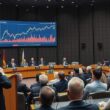A year after its launch, Germany’s critical raw materials fund remains conspicuously inactive, with the federal government yet to approve a single project. This standstill, revealed by business magazine Capital based on information from KfW, the state-owned bank tasked with administering the fund, raises serious questions about the initiative’s efficacy and the political will behind it.
The fund, initially conceived by the previous government and endowed with €1 billion, aimed to lessen Germany’s dependence on China by fostering domestic critical raw material sourcing. It offers equity financing of between €50 and €150 million for projects securing supply chains, with KfW guaranteeing the risk. Yet, KfW is currently holding almost 50 applications from companies with viable projects, including new resource extraction.
The delays are attributed to the “interministerieller Ausschuss Rohstoff” (IMA Rohstoff), a committee comprised of representatives from the Federal Ministry for Economic Affairs and Climate Action and the Federal Ministry of Finance. Its apparent inability to reach decisions is particularly baffling in the case of Vulcan Energy, an Australian-backed mining firm proposing sustainable lithium extraction in the Upper Rhine Valley. Vulcan Energy submitted a €150 million funding request in October 2023, which remains unresolved.
While the Ministries of Economic Affairs and Finance claim that auditing firm PwC has been commissioned to evaluate Vulcan Energy’s project and is currently conducting in-depth economic viability checks, critics point to a deeper issue: a potential conflict between ministries. Capital’s sources suggest disagreements over the fund’s financing may be contributing to the obstruction. The Ministry of Economic Affairs acknowledged “clarification needs” during the fund’s financing process, confirming an agreement for “shared financing” without elaborating.
The delay underscores the challenges inherent in Germany’s strategy to secure critical raw material supplies. The perceived lack of urgency from the current administration, coupled with bureaucratic hurdles and potential internal political friction, risks undermining the fund’s purpose and leaving Germany vulnerable to supply chain disruptions. The promise of initial project decisions “later this year” rings hollow without a demonstrable commitment to streamlining approvals and resolving the underlying political disagreements plaguing the initiative. The upcoming IMA Rohstoff meeting, scheduled for the end of November, offers a crucial opportunity – but whether it will finally deliver the actions necessary to unlock the fund’s potential remains to be seen.





